Losing weight is often associated with radical diet overhauls and cutting out whole food groups, but experts say just one small change could make a difference.
If those who are overweight cut their calorie intake by just 216 calories a day – the equivalent of a single bottle of fizzy drink – it could help halve obesity in the UK, public health experts said.
The statement came as the government laid out plans to tackle the UK’s “obesity epidemic” and reduce pressure on the NHS as part of its 10-Year Health Plan.
Obesity is one of the root causes of type 2 diabetes, heart disease and cancer, and rates have doubled since the 1990s, with the UK now holding the third highest obesity rate in Europe.
The forthcoming plan will see the government joining forces with the food industry to help make the average basket of supermarket goods slightly healthier. This could involve measures such as tweaking recipes, changing shop layouts and offering discounts on healthy foods.
But there are also some simple swaps you can make yourself.
Six 200-calorie snack swaps
Similar to a small bottle of fizzy drink, these common snacks all come in at around the 200-calorie mark. And while there’s nothing wrong with enjoying them occasionally as part of a balanced diet, most are low in nutritional value.
Reducing the amount you eat or swapping them for a more nutrient-rich alternative could help reduce your overall calorie, sugar, salt and saturated fat intake, and may give you some added health boosts, too.
As a reminder the NHS daily recommended calorie intake for the average person is 2,500kcals for men and 2,000kcals for women.
Fizzy drinks
As well as containing around 200kcals per single bottle, fizzy drinks are notoriously high in sugar. Just one 500ml bottle could take you way over the recommended daily amount (RDA).
A single bottle of Coca-Cola contains a whopping 53g of sugar – around 13 teaspoons. Others, such as Sprite (22g) and Dr Pepper (22g), have less but are still high-sugar options.
While diet versions are lower in calories and sugars, they can also have their downsides. Fizzy diet drinks can still contribute towards dental erosion and some studies have linked them with weight gain and an increased risk of type 2 diabetes.
Swap for: When it comes to hydration, one of the best choices is good old H20. If you find the taste of water boring, jazz it up by adding cucumber, mint, ginger, frozen lemon and lime slices or any other herb, spice or fruit that takes your fancy.
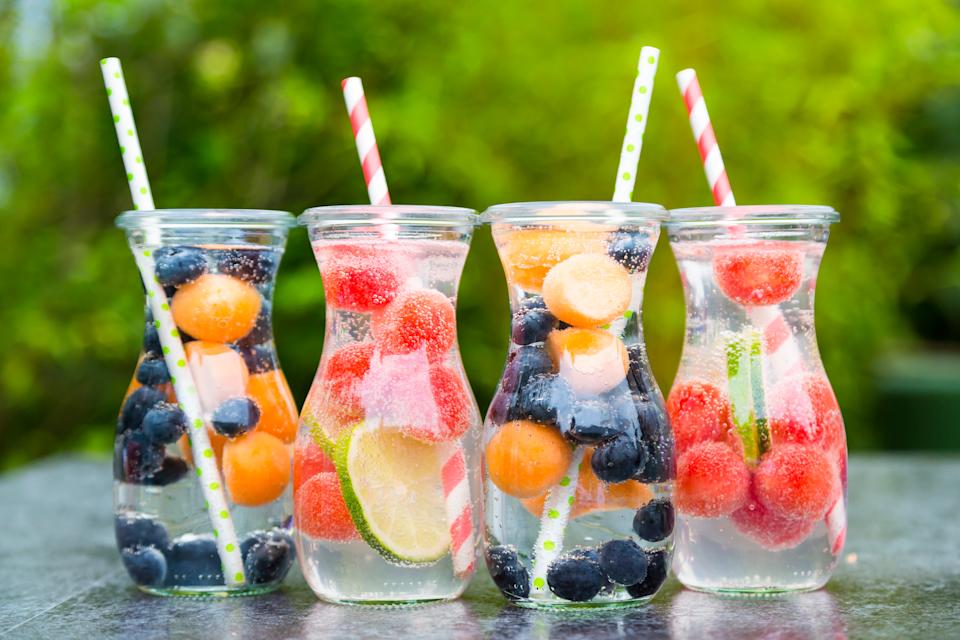
Make water more interesting by experimenting with different infusions. (Getty Images)
Grab-bag packet of crisps
Racking up around 230kcals, one grab bag of ready salted crisps can contain around 14g of fat – nearly half the recommended daily amount (RDA) for men (30g) and 70% of women’s (20g).
Swap for: For a lower-calorie, lower-fat alternative, Diabetes UK recommends trying plain popcorn instead. A 30g homemade serving contains around half the calories (116kcals) and just 1.4g of fat. Look for unflavoured, low-sugar, low-salt options. As a general rule, the fewer ingredients listed on the label, the better.

Popcorn can be a healthier option than a packet of crisps. (Getty)
Chocolate bar
A standard 51g Mars bar has 228 calories and 30.5g of sugars – higher than the total RDA of 30g. While a Cadbury’s Dairy Milk weighs in at 240kcals and 25g of sugars.
That doesn’t mean you have to forgo chocolate altogether, though. Diabetes UK recommends choosing good-quality dark chocolate with around 70% cocoa and only having a couple of squares. As dark chocolate has a stronger taste, you’re likely to want less of it.
Swap for: For a nutrient-rich alternative, try half an apple topped with a tablespoon of nut butter – look for those with no added sugar or salt. At around 150kcals or less, the protein in the nut butter and fibre in the apple will help you feel satisfied and fuller for longer, and you’ll get the added benefit of vitamins and antioxidants, too.
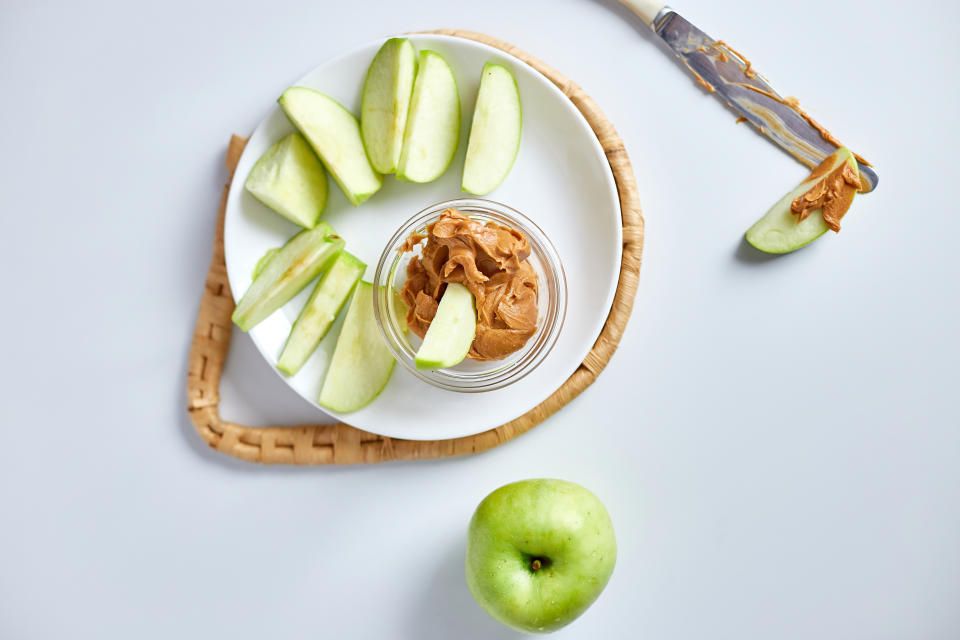
Apple with nut butter is a protein-rich snack that can help keep you feeling fuller for longer. (Getty Images)
2 x chocolate digestive-style biscuits
They might taste great with your mid-morning cuppa, but cutting back on chocolate digestive-style biscuits can help reduce your overall calorie and sugar intake.
Two biscuits typically contain around 170kcals, just under 8g of fat and 9-10g of sugars. The RDA of free sugars – those added to foods or found naturally in honey and syrups – is 30g, so those two biscuits account for around a third of your daily quota.
Swap for: For a lower-sugar, lower-calorie alternative that still hits that sweet spot, the NHS suggests swapping biccies for a slice of malt loaf (around 80kcals). Malt loaf is a bread rather than a cake, meaning it’s lower in sugar, too – one slice contains around 4g of sugars with most occurring naturally in the dried fruit.
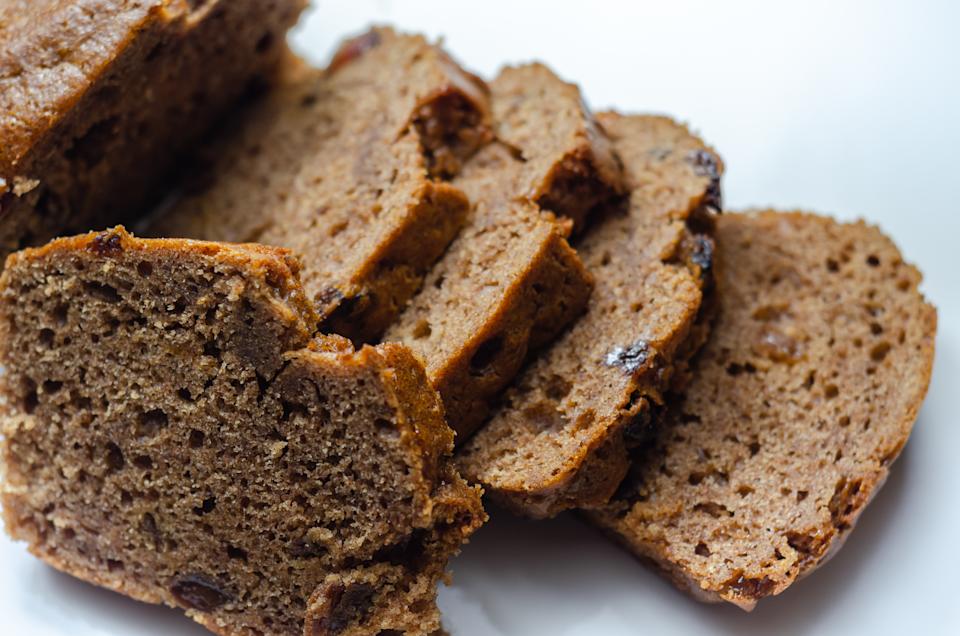
The NHS recommends malt loaf as a lower-sugar alternative to biscuits and cakes. (Getty Images)
2 x slices of white bread
Whether it’s as a snack, part of a sandwich or toasted at breakfast, many of us eat bread each day – but swapping the white sliced for wholemeal or wholegrain alternatives could have a number of health benefits.
Swap for: While the calorie count is similar (around 200kcals for two medium slices), wholemeal also offers around three times more fibre, which is important for gut health, and is associated with a lower risk of heart disease, stroke, type 2 diabetes and bowel cancer.
Fibre also helps you feel fuller for longer, meaning you’ll be less tempted to snack throughout the rest of the day.
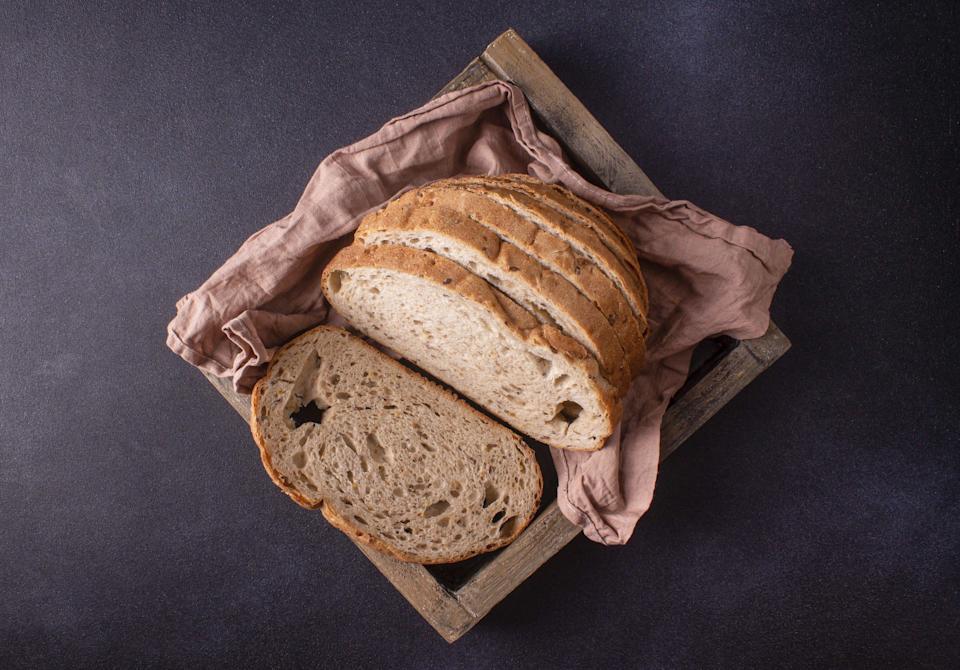
Wholemeal bread can be far better for you than white bread. (Getty Images)
Croissant
There’s no getting away from the fact that pastries are delicious, but they also have very little nutritional value. Depending on the size, type and whether or not they’re filled, a croissant can range from around 170kcals to nearly 400kcals.
They’re often high in saturated fat, too, which can lead to high cholesterol. The total amount of fat, which is usually labelled red on the nutritional labels, can range from around 8-18g of which 5-11g can be saturated.
Swap for: For a healthier morning snack, try half a toasted wholemeal bagel with half a mashed banana. Coming in at around 150-170kcals, you’ll still be getting that sweetness but with less fat (typically under 2g in total), added fibre to keep you feeling full, and vitamins including B and C6 from the banana.
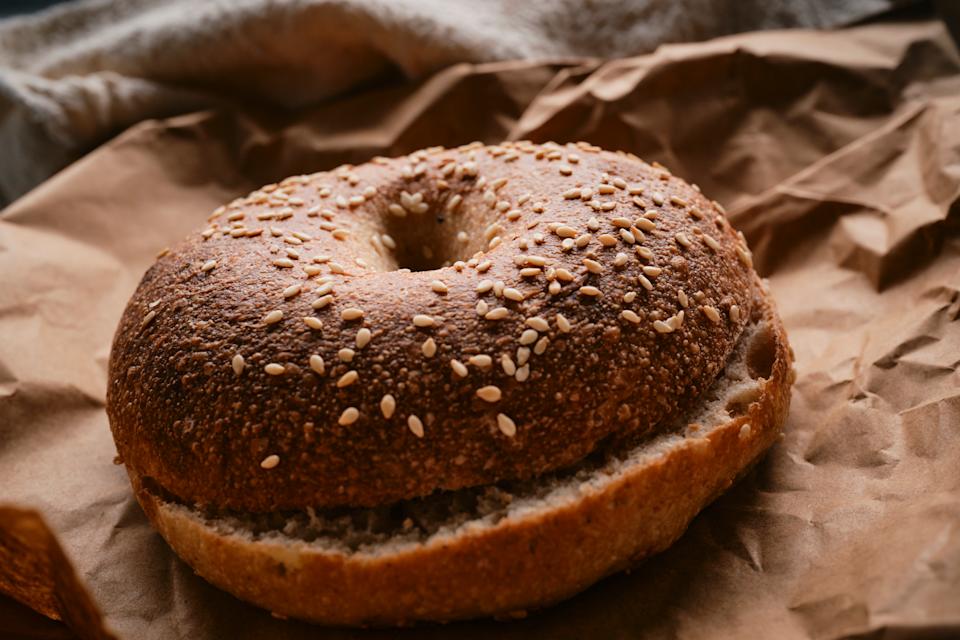
Snacks made with a wholemeal bagel can be a far healthier option than pastries. (Getty Images)
Ice cream
There’s nothing better on a warm day than a frozen treat but ice creams and some ice lollies can be high in sugar, fat and calories. A standard Magnum, the UK’s ice cream of choice, contains around 230kcals, 14g of fat and 20g of sugar, for example.
Homemade ice lollies, using 100% fruit juice or frozen fruit, can be a healthier option, or – if you’re opting for shop bought – choose those with sugar listed further down the ingredients list.
Swap for: Spoon frozen berries with 150g of low-fat Greek yoghurt and you’ll be getting a whole range of vitamins, antioxidants, calcium and protein for around half the calories. For extra sweetness add a sprinkle of cinnamon or small drizzle of maple syrup.
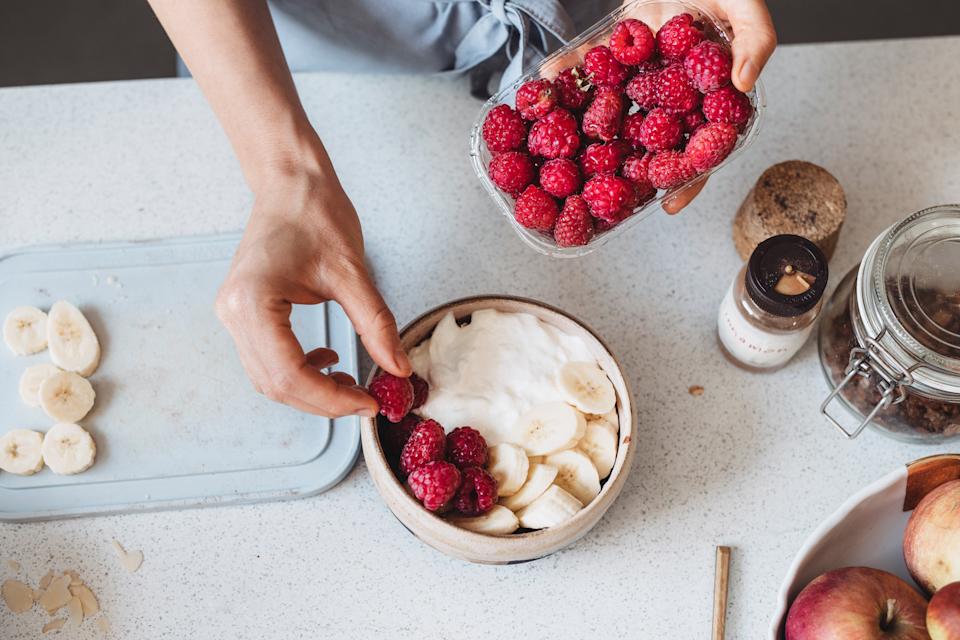
Frozen berries and low-fat Greek yoghurt make a tasty, protein-rich dessert. (Getty Images)
Read more about nutrition:
